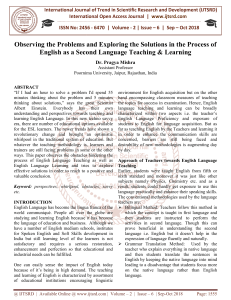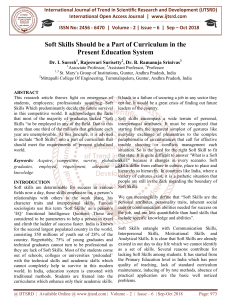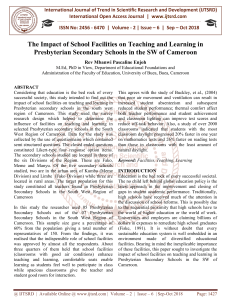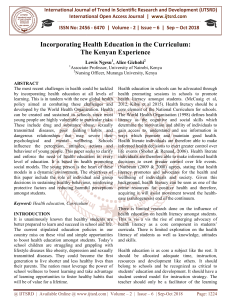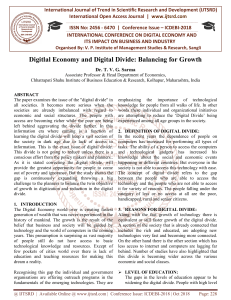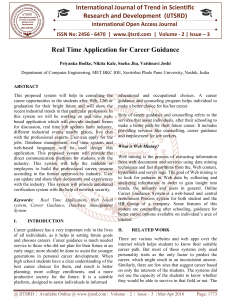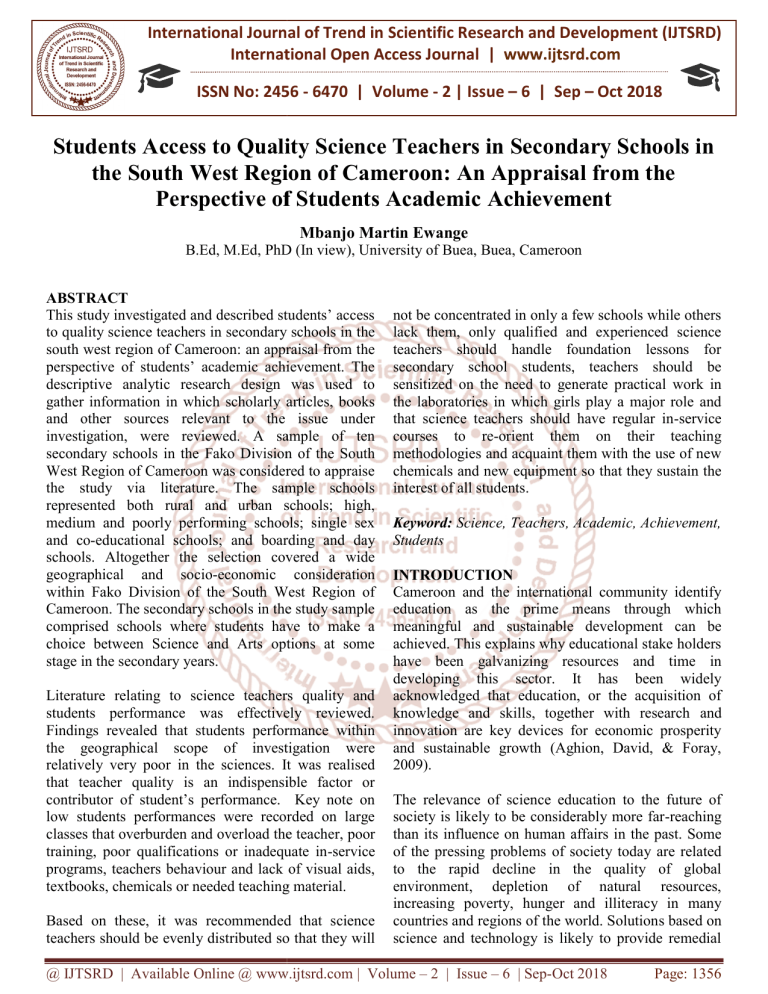
International Journal of Trend in Scientific Research and Development (IJTSRD)
International Open Access Journal | www.ijtsrd.com
ISSN No: 2456 - 6470 | Volume - 2 | Issue – 6 | Sep – Oct 2018
Students Access to Quality Science Teachers in Secondary Schools in
the South West Region of Cameroon: An Appraisal from the
Perspective of Students Academic Achievement
Mbanjo Martin Ewange
B.Ed, M.Ed, PhD (In view), University of Buea, Buea, Cameroon
ABSTRACT
This study investigated and described students’ access
to quality science teachers in secondary schools in the
south west region of Cameroon: an appraisal from the
perspective of students’ academic achievement. The
descriptive analytic research design was used to
gather information in which scholarly articles, books
and other sources relevant to the issue under
investigation, were reviewed. A sample of ten
secondary schools in the Fako Division of the South
West Region of Cameroon was considered to appraise
the study via literature. The sample schools
represented both rural and urban schools; high,
medium and poorly performing schools; single sex
and co-educational
educational schools; and boar
boarding and day
schools. Altogether the selection covered a wide
geographical and socio-economic
economic consideration
within Fako Division of the South West Region of
Cameroon. The secondary schools in the study sample
comprised schools where students have to make a
choice between Science and Arts options at some
stage in the secondary years.
Literature relating to science teachers quality and
students performance was effectively reviewed.
Findings revealed that students performance within
the geographical scope of investigation were
relatively very poor in the sciences. It was realised
that teacher quality is an indispensible factor or
contributor of student’s performance. Key note on
low students performances were recorded on large
classes that overburden and overload
load the teacher, poor
training, poor qualifications or inadequate in
in-service
programs, teachers behaviour and lack of visual aids,
textbooks, chemicals or needed teaching material.
Based on these, it was recommended that science
teachers should be evenlyy distributed so that they will
not be concentrated in only a few schools while others
lack them, only qualified and experienced science
teachers should handle foundation lessons for
secondary school students, teachers should be
sensitized on the need to generate practical work in
the laboratories in which girls play a major role and
that science teachers should have regular in-service
in
courses to re-orient
orient them on their teaching
methodologies and acquaint them with the use of new
chemicals and new equipment
nt so that they sustain the
interest of all students.
Keyword: Science, Teachers, Academic, Achievement,
Students
INTRODUCTION
Cameroon and the international community identify
education as the prime means through which
meaningful and sustainable development can be
achieved. This explains why educational stake holders
have been galvanizing resources and time in
developing this sector. It has been widely
acknowledged that education, or the acquisition of
knowledge and skills, together with research and
innovation are key devices for economic prosperity
and sustainable growth (Aghion, David, & Foray,
2009).
The relevance of science education to the future of
society is likely to be considerably more far-reaching
far
than its influence on human affairs in
i the past. Some
of the pressing problems of society today are related
to the rapid decline in the quality of global
environment, depletion of natural resources,
increasing poverty, hunger and illiteracy in many
countries and regions of the world. Solutions
Solution based on
science and technology is likely to provide remedial
@ IJTSRD | Available Online @ www.ijtsrd.com | Volume – 2 | Issue – 6 | Sep-Oct
Oct 2018
Page: 1356
International Journal of Trend in Scientific Research and Development (IJTSRD) ISSN: 2456-6470
2456
measures to some of these problems, and yet science
and technology as we understand today, are not
available to a vast human population especially
teachers teaching this field in schools. It iis essentially
in the advanced world that science and technology
have contributed to individual fulfillment, the well
wellbeing of communities, and to the health of nations. A
high percentage of the human population does not
understand science or its utility, and
nd its potential for
economic and social development. There is a
tendency to get impressed with certain products of
technology that may bring in superficial prosperity,
but a proper understanding of technological
innovation and of the way science and techn
technology are
related to society is important for real progress of all
countries, particularly the developing ones. Such an
understanding is retarded today by the barriers
impending the sharing and the use of scientific and
other knowledge necessary to make de
decisions and
choices. That is that science education attempts to
wrestle
with
three
mutually
contradictory
requirements. On the one hand it wants to
demonstrate the tremendous liberatory power that
science offers – a combination of the excitement and
thrill that comes from the ability to discover new
knowledge, and the tremendous insights and
understanding of the material world that it provides.
Yet its mechanism for achieving this aim is to rely on
a dogmatic, authoritarian and extended science
education where
ere students must accept what they are
told as unequivocal, uncontested and unquestioned.
Only when they finally begin practicing as scientists
and enter the inner sanctum will the workings of
science become more transparent. Moreover, its
foundationalist emphasis on basic concepts rather than
the grand ideas of science means that any sense of its
cultural achievement is simply forgotten.
STATEMENT OF THE PROBLEM
Research suggests that teachers play a pivotal role in
improving education, as teachers are th
the single most
important factor in predicting individual student
achievement levels (Anderson & Helms, 2001;
Darling-Hammond,
Hammond, 2002; Mendro, 1998; National
Commission on Teaching and America’s Future,
1996). According to Murnane and Steele (2007),
today’s policy
licy challenge requires more than placing
enough adults in front of classrooms; today’s policy
challenge requires that teachers in classrooms be
equipped to have strong, positive impacts on student
learning. As such, teacher quality is central to the
discussion
ssion of improving education for students in
today’s schools. When students get into the
classrooms, they are now expected to have access to
the curriculum. That is access to effective teaching
and learning.
However with the acute shortage of qualified science
sc
teachers in most of our schools particularly in rural
areas as reported by Regional Pedagogic inspectors.
One begin to wonder how effective the teaching and
learning of science is going on in such schools. As a
result of these inadequacies, students may not end up
acquiring the knowledge and skills like their
counterparts in other areas. This might lead not only
to poor academic performance but might put students
at a disadvantage position in the labour market as well
as in their personal development. Poor performances
by students in the sciences might lead to drop outs and
unemployment. Failure to acquire the knowledge and
skills from the science subjects might affect student’s
progress in their future careers in the sciences such as
engineering and medicine
edicine given that, the skills
acquired forms the bases or foundation on which their
future careers are built on. These are some of the
problems that may arise as a result of inappropriate
access to quality science teachers. It is the gravity of
these problems
lems and its impact to learning and
students’ achievements that this study attempts to
investigate.
Purpose of the Study
The purpose of this study is to investigate the extent
to which student’s access to quality science teachers
in secondary schools in Cameroon
ameroon affects student’s
academic achievement
Research Question
Does Students access to quality science teachers in
secondary schools in Cameroon influence students’
academic achievement?
BACKGROUND
Educational development in Cameroon after the
Federal administration and after the unitary state saw
an increase in the general population and that of
school going age in particular (Tambo, 2003). This
increase in population resulted to an increase in more
socio-economic
economic challenges to grapple with. The
government and international partners like the United
Nations (UN) thought that education remains the
prime means for meaningful development and
recommended an increase in educational access so as
to satisfy the quest for education by the increasing
@ IJTSRD | Available Online @ www.ijtsrd.com | Volume – 2 | Issue – 6 | Sep-Oct
Oct 2018
Page: 1357
International Journal of Trend in Scientific Research and Development (IJTSRD) ISSN: 2456-6470
2456
population as well as in a bid to enhance socio
socioeconomic development. The years that followed saw
an increase in newly created secondary schools
nationwide.
Students’ access to qualified teachers particularly in
the sciences has proven to be an important factor that
determines positive outcome. In a study carried out in
the United States, Wayne and Youngs (2003)
reviewed studies that related teacher quality to
student’s achievement. They found out that when
qualified
ied teachers with degrees were examined,
students’ outcomes were positive in mathematics.
In another study carried out by Rice (2003) in which
she focussed on five attributes of teacher quality
namely
certification,
experience,
preparation
programmes and degrees, course work, and teacher
test scores. In discussing her findings, Rice (2003)
concluded the following;
Teacher certification seems to matter for high
school mathematics
Teacher experience matters, particularly in the
first five years of teaching.
Teachers course work, whether subject specific or
in pedagogy, appears to have a positive impact on
student learning at all grade levels but subject
specific course matters most in secondary
education.
It should be noted that a qualified teacher is one
who has under gone training in both subject
specific area and in pedagogy.
In another study to investigate teacher quality as
correlates of students academic performance in
Biology in senior secondary schools in Ondo State
StateNigeria; the researchers Akinfe E, Olofeminyi, O.E,
and Fashiku C.O (2000) after data analysis, found that
the role of professionally qualified/trained teachers is
an important teacher quality which enhances students’
academic achievement in Biology. The findings
revealed that several
eral schools in the population of the
study lacked modern instructional materials without
which effective teaching and learning cannot be
utilized and teacher experience significantly influence
students academic performance.
In many nations, science and technology education
are becoming increasingly identified as the
background for economic stability and growth. In the
past, in developed and developing countries, only the
"brighter" students have been encouraged to pursue
science knowledge. Science has been
be viewed (and still
is by many) as knowledge accessible to only the elite
few. Now, however, many countries are subscribing
to the goal of "science for all." Science is increasingly
being viewed as a subject of life-long
life
utility to all
students, whether orr not they enter science-related
science
careers. In the developing world, a more science
literate populace is perceived as being better equipped
to contribute to economic and societal development
through informed decision-making
making in such areas as:
agricultural production,
duction, nutrition and health, land and
resource management, population control and
industrial growth The "science for all" movement is
driving curricular change at varying speeds in
different countries and the process of school science
curricula redefinition
ion la in motion worldwide. This
redefinition is being accompanied by a re-examination
re
of the classroom role of the teacher - supported by
findings from cognitive psychology on how students
actually learn science - from "sage on the stage, to
guide on the side." In many countries, science
teachers, particularly at the lower secondary level
(grades 7/8- 10/11), are unprepared to teach the
existing science courses in a teacher-centered
teacher
classroom (Ware, 1992). How can they be expected to
teach unfamiliar science,
ce, organized across disciplines,
using unpractised techniques and skills, to "different"
kinds of students? It is not just the "science for all"
movement that is driving curricular change. The old
disciplinary boundaries are fading in the dynamic
world of science research. Biology is becoming
chemistry which is becoming biology, touching on
physics which shades into chemistry. It is in the
bridging sciences of biochemistry, biophysics, and
materials science where much of the vitality of
modern science is best
est displayed. Yet, on a worldwide
basis, both the university courses of study and the
upper secondary (11/12-12/13)
12/13) science stream courses
tend to remain obstinately defined as chemistry,
physics, and biology as they were delineated 30 years
ago. Thus, whether
ether science is to be taught to future
scientists, or to future citizens, there is a pressing need
to ensure that the secondary science teacher, whose
role is so crucial has the educational background
necessary to rise to both challenges. The issue is not
no
that there are no well-prepared
prepared secondary science
teachers. The issue is that the purposes of science
education are changing, the content and its delivery
are evolving, and the expectations for student
achievement are rising. This is true for both
developing
ping and developed countries (Ware, 1992).
The last ten years have seen a re-evaluation
re
of the
@ IJTSRD | Available Online @ www.ijtsrd.com | Volume – 2 | Issue – 6 | Sep-Oct
Oct 2018
Page: 1358
International Journal of Trend in Scientific Research and Development (IJTSRD) ISSN: 2456-6470
2456
teaching/ learning interaction for AU school subjects.
Ten years ago, it was still general by accepting that
'teaching was telling, learning was listening, and
knowledge
nowledge was facts" (Lanier, 1992). This view of the
teaching/learning exchange is being replaced by a
more "agile" pedagogy, which recognizes the
students' own active role in the learning process, and
views the teacher as a facilitator of this process.
Today's
day's students will be tomorrow's citizens. They
will enter a workforce that needs the talents of better
educated students, capable of life-long
long self
self-directed
learning and of contnbuting to sound decision
decision-making
for their community and their country. If mo
more
students are to be taught to function at higher levels of
cognition, they will need to be taught by teachers who
can themselves operate as life-long,
long, self
self-directed
learners. Thus, because of relatively recent changes in
our views of both science bad teaching,
ching, even the very
best of teacher training facilities needs to re
re-examine
and re-evaluate
evaluate the currency of its mission and its
curriculum. There is widespread concern about the
outcomes of science education at school. For
example, the representatives of industry say that they
need more high-grade
grade scientists, technicians, and
engineers if any country is to compete successfully in
technology-intensive
intensive global markets. Whatever their
career intentions, too few young people do much
science at school once it ceases
ases to be compulsory.
This leads to fewer applications for science degrees
and reduces the supply of science graduates. Just as
importantly, the number of young people entering
non-graduate
graduate occupations involving science or
technology are reduced, which leads
ads to skills
shortages in many sectors. The Review undertaken by
Sir Gareth Roberts in 2002 summarised the scale of
this problem. It also identified some of its causes. In
particular it noted the lack of women choosing to
study science-related subjects, reports
eports by students of
their poor experience of science education, the
shortage of well-qualified
qualified and enthusiastic science
teachers, and young people’s poor image of science
sciencerelated careers. The Roberts Report led to the
government’s ten-year
year ‘Science and IInnovation
Investment Framework 2004-2014.
2014. Yet while the
strategy makes some useful references to teacher
supply and curriculum issues, it offers little guidance
on how its ambitious aims are to be achieved. The
majority of science education research conduc
conducted to
date has addressed secondary schooling, although
research into primary school science identifies similar
issues and is referred to where available. It is
important that ‘science education is needed for
citizenship’. It would be designed to develop the
t
curiosity of young people about the natural world
around them, and help them acquire a broad
appreciation of the important ideas and explanatory
frameworks of science and how scientific enquiry
works. The processes and ideas of science are of great
importance
rtance to everybody in three ways. The first is in
their personal lives, for example so that they can
validly identify the components of a healthy life-style.
life
The second is in their civic lives, so that they take an
informed part in social decisions, for example
e
on
future options for electricity Kubilay Kaptan and
Ozden Timurlenk / Procedia - Social and Behavioral
Sciences 51 ( 2012 ) 763 – 771 765 supply. The third
is in their economic lives, where they need to be able
to respond positively to changes in the
t science-related
aspects of their employment. If the major purpose of
science education is to increase the flow of specialist
scientists, technologists and engineers, it could be
argued that young people with a special talent in
science should be identified
ied as early as possible and
provided with a separate, specialised, and highly
focused science education. Such people share the
general need for a broad science education and should
not be cut off from it. In any case, there are no valid
and reliable ways in which such young people may be
identified. Some who show early promise
subsequently fade, whilst the talents of others emerge
later on. Young people today show an appetite for a
broadly-based
based education based on themes of proven
interest, and developing a range of transferable skills.
They would resist any attempt to foreclose their
choices. The best way forward is to provide the
highest grade of ‘science education for citizenship’
for all students. If that education is sufficiently
challenging and interesting,
sting, genuine high achievement
will become more widespread and will become
apparent through students’ creativity, lateral thinking,
and persistence. The young people who demonstrate
such achievement will be be increasingly motivated to
follow science-related
ted careers. What analysis and
evidence are available to help promote high quality
science education for all future citizens? There must
be a greater recognition of what students bring to their
studies and how different teaching methods engage
with their learning.
earning. The diversity in students’ learning
strategies must be met by the use of suitable teaching
methods. The curriculum must be closely matched to
the purposes of ‘science education for citizenship’.
The assessment of what has been learned must be
closely
ely matched to the purposes of that curriculum.
And, central to all of these aims, the supply,
@ IJTSRD | Available Online @ www.ijtsrd.com | Volume – 2 | Issue – 6 | Sep-Oct
Oct 2018
Page: 1359
International Journal of Trend in Scientific Research and Development (IJTSRD) ISSN: 2456-6470
2456
development, and retention of high quality teachers
must be actively pursued.
Methods
ethods employed by teachers to teach science
subjects in secondary schools are to a very large
extent influenced by the kind of resources and
facilities available in the school. The teaching
methods, in turn, influence the level and quality of
participation and performance in by students,
particularly girls. In general, where resources and
facilities - teachers, textbooks, laboratories,
chemicals, tools and equipment, teaching aids, stores,
offices etc. - are inadequate, the teaching approach
tends to be teacher-centered
centered and thus to a greater
extent affects teachers quality. This type oof approach
is heavily dominated by the teacher as he or she
lectures on the subject, gives notes and demonstrates
the practical aspects of the lesson. The students
remain passive participants expected to listen and
observe only. The teacher, therefore, is the sole source
of knowledge for the pupils. This can be risky in the
event that the teacher is inadequately informed on the
subject or is not adequately trained in the art of
communication.
A good quality secondary education is critical for
developing the
he required knowledge, skills and
attitudes to support health and well-being
being as well as
sustainable livelihoods and inclusive economic
growth. The development of higher order cognitive
and affective skills is also key, as many low
low-income
countries aspire too become knowledge economies. A
key target of the recently adopted Sustainable
Development Goal for education (Goal Four) is to
ensure by 2030 that all girls and boys complete free,
equitable and quality primary and secondary
education leading to relevant and effective learning
outcomes. Whilst there has been progress in
expanding access to primary education in the context
of the Millennium Development Goals, this has put
additional pressure on the urgent need to expand
access to secondary education and a cconsequent
improvement in the quality of teachers. At present,
millions of learners are in schools without science
teachers and many others are even denied access to a
good quality secondary education including girls,
learners in urban slum and rural areas, learners with
disabilities and members of ethnic minorities. In
2012, the average gross enrolment ratio for lower
secondary for sub-Saharan
Saharan Africa was 50% (53% for
boys, 46% for girls) (EFA Global Monitoring Report
team, 2015). For those who do gain acces
access, many
enter secondary education with low levels of learning
including basic literacy and numeracy. Teachers also
often have weak subject and pedagogical knowledge
on entering the profession contributing to poor learner
outcomes. Improving the professional
professiona capabilities of
educators to deliver quality teaching in challenging
delivery contexts is key for raising the quality of
education for all including the most marginalized.
Contrary to the 1966 study by James Coleman, as
cited in Whitehurst (2002), that suggested that
differences in teachers did not matter, recent studies
have shown that teacher quality is the single most
important
school-related
related
factor
in
student
achievement. In 1996, value added assessments were
conducted by Sanders and Rivers (Coleman, as cited
in Archer, 1999) to answer the question of whether
teachers matter. Math teachers in grades 3, 4, and 5 in
two urban school districts in Tennessee were
examined to determine the average amount of
academic growth of students in their classrooms.
From
rom this data, teachers were identified and grouped
as being the most effective teachers, the top 20%, and
the least effective teachers, the bottom 20%. The
progress of these students assigned to these effective
and least effective teachers were documented over a
consecutive three year period. The results revealed
that at the end of 5th grade, math students assigned to
the high performing teachers scored in the 83rd
percentile; students assigned to the low performing
teachers scored in the 29th percentile (Whitehurst,
(
2002). In 1997, a similar study related to long-term
long
teacher effectiveness was conducted in Dallas, Texas.
Researchers extended the study across a wide range of
grades, used three different urban school districts and
two different methods of determining
de
teacher
effectiveness, and yielded similar results, emphasizing
the measurable difference that better teachers have on
student performance (Bembry, Jordan, Gomez,
Anderson, & Mendro, 1998). In effect, these findings
differ from the research of James
Ja
Coleman in the
1960s that was interpreted as such, “the general
message taken from Coleman’s findings is that
socioeconomic status largely determines student
achievement . . . and what schools do doesn’t matter
very much, because in the end poor kids learn
l
very
little and rich kids learn a lot” (Archer, 1999, p. 3).
The results of these longitudinal studies show that
teachers are an influential factor of student
achievement, regardless of socioeconomic status and
even school location. In other words, a student having
an ineffective teacher several years in a row can be at
@ IJTSRD | Available Online @ www.ijtsrd.com | Volume – 2 | Issue – 6 | Sep-Oct
Oct 2018
Page: 1360
International Journal of Trend in Scientific Research and Development (IJTSRD) ISSN: 2456-6470
2456
an academic disadvantage, which affects his/her
progress for years; whereas, a student with a highly
effective teacher can have positive gains in academic
progress for years to come. Various
rious research studies
(Blair 2000b; Darling-Hammond
Hammond 2000; Hanushek
1971,) reveal that factors such as cognitive ability,
subject matter knowledge, knowledge of teaching and
learning, licensure, and teaching behaviors in the
classroom are related to teacherr quality and increased
student achievement. The purpose of this paper is to
identify the indicators of quality teachers and their
impact on student achievement by conducting a
literature review.
The system theory is well rooted in a study of this
type. According
ccording to Houghton et al (1975) a system is
‘a set of objects together with relationships between
the objects and between their attributes. All systems
except the smallest have ‘subsystems’ and all but the
largest have supra systems’ which are their
environments.
ronments. Systems may be open or closed. An
open system is that which is related to and makes
exchange with its environment, while a closed system
is not related to and does not make exchanges with its
environment (Mbua, 2003). Also closed systems are
characterized
acterized by an increase in entropy end in stability
while open system is a good example of an open
system given that it has interdependent components
(subsystems) as well as makes exchanges with the
environment.
In the context of this study, the secondar
secondary education
equally is equally an open system which has
interdependent components as well as makes
exchanges with the environment.
The components that make up the secondary school
science curriculum here include qualified teachers, the
use of appropriate teaching methods; teaching
resources, learning activities, assessment strategies
etc. These components interact in an interdependent
and holistic manner to enhance effective teaching and
learning and consequently student’s achievement. If
one of the components
ents is absent or ineffective, then
the purpose of effective teaching and learning may be
hindered. For instance if qualified science teachers are
not there to teach or if appropriate teaching resources
are absent, then effective teaching and learning migh
might
not take place. This may consequently affect student’s
performance. This implies that for access of the
secondary school science curriculum to be attained all
the above mentioned components should be
effectively present in order to enhance effective
teaching
hing and learning which shall consequently
improve students’ performance.
METHODOLOGY
The present study involved a descriptive analytic
research design. A literature review surveys scholarly
articles, books and other sources relevant to a
particular issue, area of research, or theory, and by so
doing, providing a description, summary, and critical
c
evaluation of these works. Literature reviews are
designed to provide an overview of sources you have
explored while researching a particular topic and to
demonstrate to your readers how your research fits
into the larger field of study. This study has surveyed
and described literature relating to students access to
quality science teachers in secondary schools in
Cameroon and its implication to students academic
achievement. The
he study covered a sample of ten
secondary schools in the Fako Division of
o the South
West Region of Cameroon. The sample schools
represented both rural and urban schools; high,
medium and poorly performing schools; single sex
and co-educational
educational schools; and boarding and day
schools. Altogether the selection covered a wide
geographical and socio-economic
economic consideration
within Fako Division. The secondary schools in the
study sample comprised schools where students have
to make a choice between Science and Arts options at
some stage in the secondary years
FINDINGS
Research findings
gs show a positive relationship
between science teacher’s cognitive ability and
student achievement. A study by Hanushek (1971)
presents an interesting view of teachers. In his model,
the teacher characteristic that appears to contribute to
increased student
nt academic performance is a teacher’s
verbal ability. For both second and third grade
teachers, the score on a verbal ability test plays two
roles: first it is a measure of communicative ability;
second, it can be taken as a quick measure of overall
intelligence
ligence and ability. Thus, overall intelligence or
general ability seems important regardless of formal
training. There is more research that shows that
teachers who have strong verbal ability or score high
on verbal tests impact student achievement more than
t
teachers with lower scores.
Subject matter knowledge is another variable that is
related to teacher effectiveness. In a major study
conducted by Wenglinsky on the relationship between
@ IJTSRD | Available Online @ www.ijtsrd.com | Volume – 2 | Issue – 6 | Sep-Oct
Oct 2018
Page: 1361
International Journal of Trend in Scientific Research and Development (IJTSRD) ISSN: 2456-6470
2456
indicators of teacher quality and the performance of
8th graders, teacher educational backgrounds appear
crucial to the student performance on science portions
of the 1996 National Assessment of Educational
Progress
(Blair,
2000b).
Upon
examining
approximately 15,000 scores of 8th grade students’
science performances, students
udents whose teachers had
college majors or minors in either math or science
scored 39% higher than those whose teachers lacked
such preparation. In addition, Monk, as cited in
Darling-Hammond
Hammond (2000), using data on 2,829
students from the Longitudinal Studyy of American
Youth, found that teachers’ content preparation, as
measured by coursework in the subject field, is
positively related to student achievement in
mathematics and science.
While these studies appear to support the relationship
between subject matter and teacher effectiveness,
other researchers as cited in Darling
Darling-Hammond
(2000), find that the connection between the two
variables have mixed results. Studies of teachers’
scores on the subject matter tests of the National
Teacher Examinations (NTE)) have found no
consistent relationship between this measure of
subject matter knowledge and teacher performance as
measured by student outcomes. Byrne (as cite in
Darling Hammond, 2000) did thirty related studies
between subject matter knowledge to studen
student
achievement. The results were mixed with 17 showing
a positive relationship and 14 showing no
relationship. Also, studies by Ashton and Crocker
(1987) found only 5 out of 14 studies they reviewed to
show a positive relationship between subject matter
and teacher performance. Despite the mixed findings,
it may be safe to conclude that teachers who hold
College majors or minors in the subject area that they
are teaching, especially in math and science,
positively impact student learning in those subject
areas.
While the evidence that subject matter makes a
difference is mixed, research shows that teacher
education coursework has a positive effect on student
achievement. A study was conducted on the teacher
education program at Arkansas Tech University to
determine
termine the extent to which education and subject
matter course work predicted the teaching
performance of student teachers completing the
program (Ferguson & Womack, 1993). Findings
indicate that course work in teacher education makes
a difference in teaching
hing performance; education
coursework is a more powerful predictor of teacher
effectiveness than measures of expertise in content
area subjects. Furthermore, Ashton and Crocker
(1987) compared professional education and
academic subject area coursework to determine
whether there was a relationship between the two
variables and teaching effectiveness. The findings
revealed that there was a positive relationship in four
out of seven studies when researchers related the
number of credits in education coursework.
coursewo
In
contrast, a positive relationship was found in only five
out of fourteen studies when the number of college
credits earned in a subject area compared with student
performance in that area. Furthermore, teachers’
professional knowledge and skills can be developed
through professional development and in-service
in
programs to achieve successful student outcomes
(King & Newmann, 2000). For example, at Lewis
Elementary
School
in
Texas,
professional
development focused on teaching strategies to
teachers in reading
eading and math, strategies that the
students can use themselves. Over a 4-year
4
period,
students’ reading and math achievement improved
dramatically across a range of social backgrounds
(King & Newmann, 2000). Studies cited in DarlingDarling
Hammond (2000) find that
hat teacher opportunities to
participate in professional development in content
specific areas linked to the curriculum made an
impact on teaching and student achievement.
Therefore, teacher preparation education coursework
is beneficial and worthwhile in making an educational
difference.
Research on teacher behaviors in the classroom
demonstrated that effective teachers tend to be those
who are able to use a variety of teaching strategies
and demonstrate a flexible style rather than a single,
rigid approach.
ch. Studies cited in Darling-Hammond
Darling
(2000) suggest that it is the expertises of the teachers
that make learning occur for students. In general,
effective teachers are able to adjust their teaching
style to fit the needs and style of different learners
because
ause they have a wide repertoire of approaches and
strategies, such as direct teaching, modeling
interactive teaching strategies, cooperative learning
techniques, and experienced-based
experienced
and skill-based
approaches. As cited in Darling-Hammond
Darling
(2000),
other variables
ariables that have been found to be important
are teacher clarity, enthusiasm, task-oriented
task
behavior, and higher order thinking. In effect, high
quality instruction depends on competence and
attitudes of each individual teacher. In the report of
@ IJTSRD | Available Online @ www.ijtsrd.com | Volume – 2 | Issue – 6 | Sep-Oct
Oct 2018
Page: 1362
International Journal of Trend in Scientific Research and Development (IJTSRD) ISSN: 2456-6470
2456
the National
nal Commission on Teaching and America’s
Future the standards and assessments that have
emerged from the National Commission on Teaching
and America’s Future identify that an effective
teacher should have an understanding of how students
learn and develop, skills in using a range of strategies;
sensitivity and effectiveness in working with students
from diverse backgrounds, the ability to work well
with parents and other teachers, and assessment
expertise capable of discerning how well children are
doing, what
hat they are learning and what needs to be
done next to move them along (Darling
(Darling-Hammond,
1996). Therefore, the fact remains that teaching
behaviors and practices facilitate student learning.
Quality teachers
eachers are an indispensable resource in the
teaching and learning of sciences in secondary
schools but from literature and findings in this study,
they can be rendered ineffective by any one or a
combination of the following factors:
large classes that overburden and overload the
teacher
poor training, poor qualifications or inadequate in
inservice programs
lack of visual aids, textbooks, chemicals or needed
teaching material
The
he study found out that there is a great shortage of
science teachers at the secondary school level, and the
few there are, have to be shared by a large number of
students which puts a heavy workload on the teachers.
At the same time, the study revealed that most science
teachers are male. There are relatively few female
teachers teaching sciences in secondary schools and
hence girls and society at large lack what would be
the most immediate female role models in science
education. For example, of the 145 teachers contacted
in the 10 secondary schools considered in this study,
only 33 were females. More seriously is the fact that
more thann 50% of students were not satisfied with the
delivery of lessons by their teachers and equally
pointed to the fact that performances in most science
subjects is usually lower than in arts disciplines.
It is equally noticed that this problem is not unique to
schools in Fako Division of the South West Region
of Cameroon but is visible in other divions of the
country and beyond.
This
his general shortage of science teachers has created a
situation were the few available are too loaded with
work that seriously affects quality and consequent
performance of students The
he study revealed that most
teachers at secondary schools are inadequately
inadequat
trained
and almost never participate in any in-service
in
training.
Most lack creativity and initiative and will not
improvise where there are no readymade visual aids.
Most are ignorant of’ unique problems relating the
delivery of science lessons. Some lack
l
competence in
the use of equipment available in their schools and so
such equipment remains unused. Practical work
requires time to plan, try out, set for the class and
remove and clear up after the lesson. Some teachers,
being poorly motivated, find it
i difficult to spare time
for such a process.
Itt emerged from group discussions with parents and
students of secondary schools that some teachers
misuse school time on extra-curricular
extra
activities
intended to supplement their meager incomes. Private
tuition
n in the evenings has become a significant part
of school life. Parents complained that as a result,
some teachers have no time for students from poor
families.
In
n addition, many teachers complain that science
syllabuses, mainly at the secondary level, are
inordinately long and that there is not sufficient time
to cover the syllabus adequately. This is often the
pretext for skipping practical work, even where
equipment is available, on the basis that practical
work takes up too much class time. The unwillingness
unwil
to engage in practical work is bolstered by
examinations which test learned knowledge and not
practical skills
CONCLUSIONS
Given the important findings of this research
policymakers and educators need to invest in critical
areas that impact the quality of teacher and the quality
of teaching. While it is no secret that better teachers
produce better learning, educational reform must
work toward restructuring and reinventing teacher
preparation and professional development by
connecting clinical work
rk in schools with knowledge
about what works for teaching and subject-matter
subject
knowledge. If we are going to hold students to
standards, we need to be able to ensure that the
teachers who work with them will also be able to
teach to those standards. Thirdly,
Thirdly teachers do matter,
and their cognitive ability and knowledge of the
subject matter and of teaching and learning, licensure,
and teaching behaviors in the classroom are related to
teacher quality. Major changes in the areas of
@ IJTSRD | Available Online @ www.ijtsrd.com | Volume – 2 | Issue – 6 | Sep-Oct
Oct 2018
Page: 1363
International Journal of Trend in Scientific Research and Development (IJTSRD) ISSN: 2456-6470
2456
recruitment, preparation, licensing,
icensing, teacher support
and opportunities for professional growth need to
occur in order for teaching to improve, thus inevitably
and positively affecting the most important variable of
all, the student.
Recommendations
1. Science teachers should be evenly distributed so
that they will not be concentrated in only a few
schools while others lack them.
2. Only qualified and experienced science teachers
should handle foundation lessons for secondary
school students.
3. Teachers should be sensitized on the need to
generate practical work in the laboratories in
which girls play a major role.
4. Science teachers should have regular in
in-service
courses to re-orient
orient them on their teaching
methodologies and acquaint them with the use of
new chemicals and new equipment so that they
sustain the interest of all students
REFERENCES
1. Archer, J. (1999). Sanders101. Education Week,
18(34), 26-28.
28. Retrieved November 16, 2003,
from
Academic
Search
Elite:
http://www.epnet.com/academic/asearchelite.asp
evidence. Education Policy Analysis Archives,
8(1), Darling-Hammond,
Hammond, L., & Youngs, P. (2002).
7. Defining “Highly qualified
ified teachers”: What does
“Scientifically-based
based research” actually tell us?
Educational Researcher, 31(9), 13-25.
13
8. Ferguson, P., & Womack. S. T. (1993). The
impact of subject matter and education
coursework on teaching performance. Journal of
Teacher Education,
tion, 44(1), 55-63.
55
9. Greenwald, R., Hedges, L. V., & Laine, R. D.
(1996). The effect of school resources on student
achievement. Review of Educational Research,
66(3), 361-396.
10. Hanushek, E. A. (1971). Teacher characteristics
and gains in student achievement:
achieveme
Estimation
using micro data. The American Economic
Review, 61(2), 280-288.
11. King, M. B., & Newmann, F. M. (2000). Will
teacher learning advance school goals? Phi Delta
Kappan, 81(8), 576-580.
580. Rotherham, A. J., &
Mead, S. (2003).
12. Teacher quality: Beyond
d no child left behind. A
response to Kaplan and Owings (2002). NASSP
Bulletin, 87(635), 65-76.
2. Ashton. P., & Crocker, L. (1987). Systematic
study of planned variations: The essential focus of
teacher education reform. Journal of Teacher
Education, 38, 2-8.
13. U.S. Department of Education, Office of
Elementary and Secondary Education. (2002). No
Child Left Behind Act of 2001. Washington, DC:
Author. Whitehurst, G. J. (2002, June).
3. Bembry, K. L., Jordan, H. R., Gomez, E.,
Anderson, M. C., & Mendro, R. L. (1998). Policy
implications of long
ong term teacher effects on
student achievement. Retrieved November 16,
2003,
from
http://dallasisd.org/depts/inst_research/aer98rm1.h
tml Blair, J. (2000a).
14. Raising student achievement: The evidence of
high quality teaching. Remarks presented at the
Standards-based
based Teacher Education Project 2002
Summer Conference. Retrieved November 16,
2003
from:
http://www.chttp://www.c
be.org/pdf/STEP2002whitehurst.pdf
4. Certification found valid for teachers. Education
Week, 20(8), 1. Retrieved November 16, 2003,
from
m
Academic
Search
Elite:
http://www.epnet.com/academic/asearchelite.asp
Blair, J. (2000b).
5. ETS study links effective teaching methods to
test-score
score gains. Education Week, 20(8), 24.
Darling-Hammond,
Hammond, L. (1996). What matters most:
A competent teacher for every
ery child. Phi Delta
Kappan, 78(3), 193-200.
6. Darling-Hammond,
Hammond, L. (2000). Teacher quality and
student achievement: A review of state policy
15. Brown, J.S., Collins, A. & Duguid, S. (989).
Situated Cognition and the
Culture
of
Learning.. Educational Research, 18(1), 32-42.
32
16. Engestrom, Y., Mietinnen, R., and Runamaki R-L.
R
(Ed’s 1999) Perspectives on Activity theory.
theory
Cambridge: Cambridge University Press.
17. Gagne, R. M (1985) The conditions of learning
(4th ed). New York: Holt, R
Rinehart
Winston.
18. Lave, J. Situated Learning: Legitimate Peripheral
Participation.. Cambridge, Uk: Cambridge
University press.
@ IJTSRD | Available Online @ www.ijtsrd.com | Volume – 2 | Issue – 6 | Sep-Oct
Oct 2018
Page: 1364
International Journal of Trend in Scientific Research and Development (IJTSRD) ISSN: 2456-6470
2456
19. Mac Ojong. T.T (2008) Philosophical and
Historical foundations of
Education
in
Cameroon 1844-1960:: Limbe. Design House
20. Mbua, F.N. (2003) Educational Administration!
Theory and Practice. Limbe: Design House.
22. Tambo, L, I (2012) Principles and Methods of
Teaching Limbe: Limbe: Design House
23. Tambo, L. I (2003) Cameroon National Education
Policy Since the 1995 forum:
forum Limbe: Design
House
21. Mkpa, M.A. (1990) Curriculum Development and
Implementation. Owerri:
Totan Publishers
Limited
@ IJTSRD | Available Online @ www.ijtsrd.com | Volume – 2 | Issue – 6 | Sep-Oct
Oct 2018
Page: 1365

